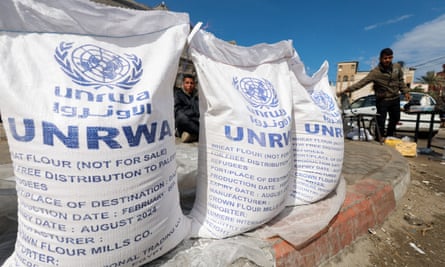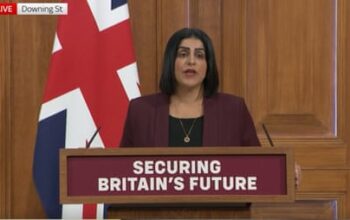According to UK Foreign Office Minister Andrew Mitchell, the decision to lift the suspension of funding for Palestinian relief agency UNRWA will not be made by countries such as the US, UK, Italy, Switzerland, Germany, Finland, the Netherlands, and Australia until they have reviewed two interim reports on the organization.
Mitchell’s statement delayed the funding decision for several weeks and goes against the decision made by Sweden, Canada, and the EU to resume funding for the agency.
During a discussion with members of British Parliament, the minister acknowledged that the global community held differing opinions on the matter. However, the minister expressed assurance that UNRWA has the financial resources to continue its operations. Last week, Mitchell held a meeting with UNRWA director Philippe Lazzarini in London.
Mitchell mentioned two reports that are expected from an internal UN investigation team and Catherine Colonna, the past French foreign minister. Colonna visited Israel this week to gather evidence from the Israeli government regarding their accusations that 12 UNRWA employees were involved in an attack on Israel on October 7, resulting in the death of 1,200 Israelis. These claims caused many western nations to stop their funding support.
Colonna will deliver her progress report at the end of March and her final report one month after. This week, Israel was anticipated to provide intelligence to her regarding Hamas tunnels located near UNRWA buildings, reported acts of terrorism by UNRWA staff members, and instances of UNRWA facilities being used to launch attacks on Israel.

There is a disagreement over the credibility of the evidence submitted by Israel for the UN report. The relationship between UNRWA and Israel is at a critical stage as Cogat, the Israeli agency in charge of coordinating aid with UNRWA, has accused Lazzarini of making false claims about hindrances to aid entering Gaza.
UNRWA, on its end, has stated that certain pieces of evidence implicating its personnel in the October 7 assaults were obtained through coerced confessions from detained staff who were subjected to imprisonment and physical abuse by Israelis.
Mitchell stated that he opposed imposing a ban on sending weapons to Israel, explaining that the British government’s stance is that Israel has the capability and willingness to adhere to international laws protecting humanitarian rights. This viewpoint is subject to continuous evaluation. His statement does not address the effects of the Israeli military offensive, only their underlying intentions, however the fact that no arms export licenses have been revoked suggests that the UK believes Israel to be following international laws. Additionally, Mitchell mentioned that the average number of trucks entering Gaza has risen from 97 per day in February to 162 per day in March.
The UK’s foreign secretary, David Cameron, has proposed that Israel should permit 500 trucks to enter Gaza each day. After returning from a trip to Egypt, Alicia Kearns, the chair of the foreign affairs select committee, encouraged the UK government to put pressure on Israel to accept an offer from their spokesperson, Eylon Levy, to raise the aid quota by 100 trucks per day.
In the letter outlining the offer from Levy, she stated that the government of Israel claims there are no difficulties in providing aid to Gaza. However, this contradicts my own findings and the assessments of international aid groups and governments I have discussed with. You have also emphasized in your recent statements and media appearances that Israel has the ability to increase aid shipments if it desires to do so.
Mitchell did not specifically mention the offer from Israel, however, he did state that providing aid to Gaza through land transportation is the most efficient and effective method, compared to using air or sea routes.
Source: theguardian.com


